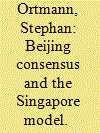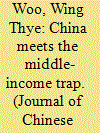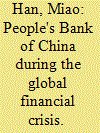| Srl | Item |
| 1 |
ID:
116497


|
|
|
|
|
| Publication |
2012.
|
| Summary/Abstract |
What is today touted as the 'Beijing consensus' or the 'China model' is nothing more than a resized version of the 'Singapore model' or an attempt to revive the developmental state. In particular, the 'Beijing consensus' assumes a greater role for the state in the economy under authoritarian rule. Since Deng Xiaoping's Southern Tour in 1992, Chinese academics, politicians, and administrators have flocked to the soft-authoritarian city-state and the result has not only been a sprawling discourse but also a number of political reforms aimed at increasing the effectiveness of the state and strengthening one-party rule. An analysis of this discourse shows that while providing Chinese policy-makers with many important ideas, these studies reveal serious weaknesses in China's attempt to follow the 'Singapore model'. Instead of having found an alternative authoritarian state-capitalist model, the 'Beijing consensus' is only a transitory phase.
|
|
|
|
|
|
|
|
|
|
|
|
|
|
|
|
| 2 |
ID:
116496


|
|
|
|
|
| Publication |
2012.
|
| Summary/Abstract |
We follow Woo (2011) in using the Catch-Up Index (CUI) to define the middle-income trap and identify the countries caught in it. The CUI shows that China became a middle-income country in 2007-2008. We see five major types of middle-income trap to which China is vulnerable: (a) fiscal stress from the nonperforming loans generated by the interaction between the lending practices of the state banks and the innate desire by state enterprise managers to over-invest and embezzle; (b) the frequent use of macro-stabilization tools that hurt long-term productivity growth; (c) flaws in socio-political governance that exacerbate social tensions; (d) ineffective management of environmental challenges that threaten sustainable development; and (e) inept handling of international economic tensions that could unleash trade conflict. We recommend new governance principles and management methods to prevent China from falling into these five types of middle-income trap.
|
|
|
|
|
|
|
|
|
|
|
|
|
|
|
|
| 3 |
ID:
116495


|
|
|
|
|
| Publication |
2012.
|
| Summary/Abstract |
Drawing on the fast growing literature concerning Chinese development and transition, we sketch a general framework for understanding the 'China Miracle' that the 'conventional wisdom' and 'Washington Consensus' cannot fully explain. Reflecting upon the recent financial crisis and the subsequent worldwide economic downturn, an attempt is made to present a paradigm, inspired by Chinese practice over the past decades, from a historical perspective. We conjecture that a desirable China model may maintain the characteristics of a good economy as proposed in Phelps (2006) with full employment and rights to personal development. With regard to the functioning of freely competitive markets and macroeconomic policy, not only should a China model be able to mimic the rule of law and accountability of liberal western democracies, but it might also possess a mainstream ideology that is deeply rooted in Chinese culture with modern social sciences as theoretical foundations. To divest China of undesirable properties from the existing system, it is necessary to establish a principle-agent relationship that can provide stable governance structure for day-to-day efficient management of the economy and society, and protect the fundamental interests of its citizens when external challenges threaten to weaken social cohesion and political stability.
|
|
|
|
|
|
|
|
|
|
|
|
|
|
|
|
| 4 |
ID:
116499


|
|
|
|
|
| Publication |
2012.
|
| Summary/Abstract |
This paper attempts to examine the impact of government intervention on executive compensation contracts by employing the data of listed companies in the Chinese equity market. The results show that redundancy burden caused by government intervention significantly reduces the compensation-performance sensitivity of executives in state-owned enterprises (SOEs), increases the level of compensation stickiness and leads to more executive perks. However, there is no evidence to support this conclusion in non-SOEs. Our results indicate that government has great responsibility for redundancy in SOEs and has a significant impact on the design of executive compensation contracts, but has limited impact on that of non-SOEs. Therefore, the impact of redundancy burden on executive compensation contracts is different between SOEs and non-SOEs. Our findings have important implications for the relationship between property rights and corporate performance, the formation mechanism of redundancy, and the impact of redundancy burden on executive compensation contracts.
|
|
|
|
|
|
|
|
|
|
|
|
|
|
|
|
| 5 |
ID:
116498


|
|
|
|
|
| Publication |
2012.
|
| Summary/Abstract |
During the economic crises of?the last decade or so, China suffered limited losses; this is evident from studies of both the 1997 Asian Financial Crisis (AFC) and the 2008 global financial crisis (GFC). China has gone on to achieve unparalleled GDP growth since the second half of 2009, when most of the developed world still struggled to recover. Throughout this period central banks have widely employed various instruments to manage the various crises. Although the People's Bank of China (PBC) has adopted complicated facilities to mitigate contagion from the global market, China's uncompleted financial reform has initially limited its exposure to external shocks. This paper therefore explores the PBC's role and its emerging limitations by comparing its performance in these two crises. Although the PBC has assisted China to achieve its immediate target of economic recovery, economic imbalance has been in effect deteriorated from the longer-term perspective due to internal susceptibility to external shocks.
|
|
|
|
|
|
|
|
|
|
|
|
|
|
|
|